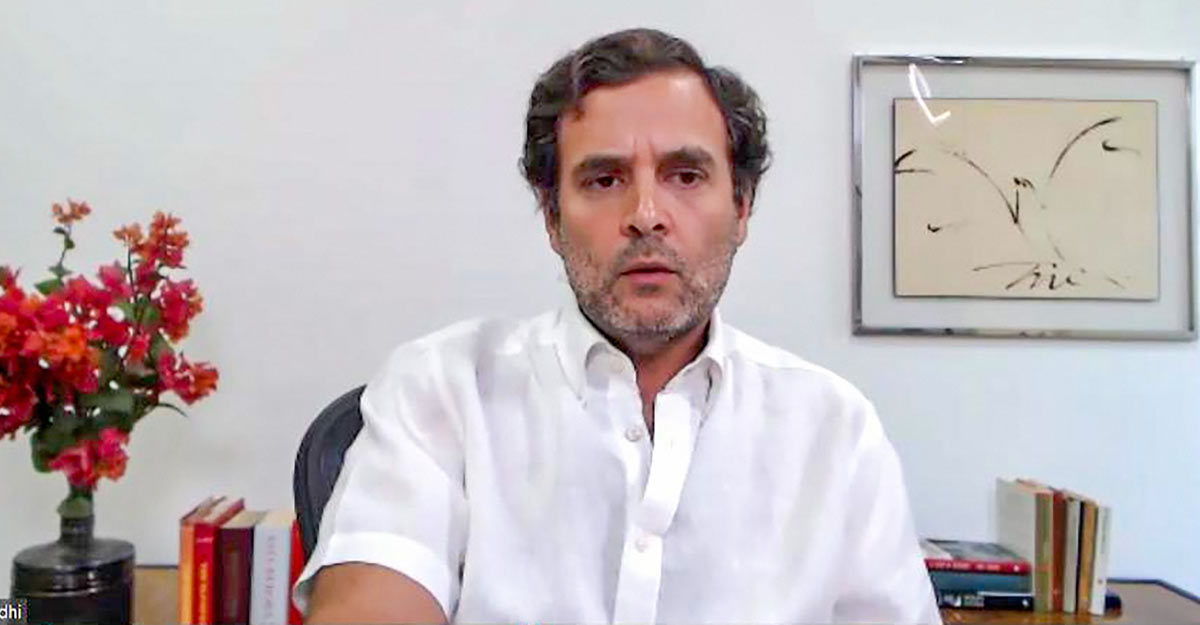India’s vibrant system is in sharp relief to the nihilism in Washington.
Rahul Gandhi’s sophomoric statement “there is no democracy in India”, propounded outside Rashtrapati Bhavan on 24 December after a Congress delegation had met the President of India to submit a memorandum supporting the agitating farmers, was rather oxymoronic. The very act of the Rashtrapati receiving a delegation of the largest Opposition party to protest against government policy was by itself a spectacle of democratic agility. Next day, Prime Minister Narendra Modi chided his bitter expositor by strobe lighting that while local body elections had been peacefully conducted in once-troubled Jammu & Kashmir, the government run by Congress in tranquil Puducherry has not held local polls despite Supreme Court having nudged it to do so in 2018 (the election process there is in a limbo since 2011).
After this, swaggerer Rahul Gandhi boarded a flight and went to an “unknown destination” abroad—his party spokespersons said he had gone to look up his aged granny in Italy. The 136th anniversary of the founding of Indian National Congress, the party under Rahul Gandhi’s surrogate control, was on the 28 December; apparently this date of national importance was inconsequential to him. That day, his mother, Sonia Gandhi, who has the interim charge of the party since he quit as president, post the 2019 Lok Sabha debacle, issued a statement saying that there is “dictatorship everywhere” and proclaimed that the circumstances in India were similar to those “existing before Independence”.
Opposition parties in a democracy have the intrinsic right to question the ruling dispensation. This democratic equity is the leitmotif of India that is Bharat. Does that appropriate the right to deride and question existence of democracy, the sheet anchor of the Republic of India? And that too at a time when Vidhan Sabha elections have been conducted peacefully amid pandemic in a hitherto volatile state like Bihar and polls to elect local self government bodies concluded with glory in resilient Jammu & Kashmir?
The conduct of elections in India in 2020 is in sharp relief to the bedlam witnessed during the Presidential poll in the US. Not only has the process been peaceful and unacerbic; the verdicts have been gracefully accepted. In J&K, the grand showing of the Opposition “Gupkar Alliance” led by the National Conference in the Valley, while BJP swept Jammu and established a foothold in Kashmir, coupled with the emergence of nascent faces in the form of Independents and the Apna Dal, shows the success of the process of a vibrant democracy. Congress continued its slide to the margins in both polls. Bihar holding a harmonious election and J&K joining the national mainstream are symbols of this vibrancy.
A few days preceding Rahul Gandhi’s postulate on India’s democracy, the British newspaper, the Independent carried a Washington datelined report which said that President Donald Trump, not convinced that Joe Bidden had won, had mulled martial law to overturn poll results. Quoting the New York Times, the report said the move had been aborted as Army Secretary Ryan McCarthy and the chief of the US military, James McConville, had issued a statement saying that there “is no role for the US military in determining the outcome of an election”. Eyes are now on 6 January, when in the intricate process of the American system, the Electoral College has to approbate the popular mandate, clearing the way for change of regime. Donald Trump, as yet, is not inclined to hand over the baton to Joe Biden and a section of Republicans have announced that they will raise objections when the US Congress meets coming Wednesday to affirm Biden’s victory. In this melee, no one is questioning the validity of democracy in the US of A.
When Indira Gandhi lost in March 1977, the nation was still under internal Emergency. Not for a moment was there a doubt that a regime change was on the cards. In 1989, when Rajiv Gandhi was ousted, with 197 seats Congress was way ahead of V.P. Singh’s tally of 143—the outgoing Prime Minister did not mull the idea of manoeuvring to retain power. Seeds of democracy were sown by Jawaharlal Nehru and the founding fathers of the Constitution of India and they took deep root in the initial years itself. Thrice during his 17 years in power, Nehru offered to resign when cornered by his opponents. But having made their point, his detractors, respecting the people’s mandate, did not allow him to quit.
Socialists under Ram Manohar Lohia (whose party never emerged as the principal Opposition through the ballot box) used to agitate against Nehru and Indira Gandhi: their slogan was “zinda quaumen paanch saal tak intezar nahi karteen” (vibrant people don’t wait for five years). Rahul Gandhi’s demeanour seems to be influenced more by Lohia (who was a great freedom fighter and a stalwart of post-Independence India) than by the democratic temper of Jawaharlal Nehru.
The vibrancy of a democracy can be determined by the existence of an effective Opposition. Congress still remains the party with the largest nationwide footprint, while BJP is slowly and steadily usurping the mantle of being the pan-India juggernaut. BJP uses every poll, from a panchayat or municipality to the Lok Sabha, to enlarge its imprint. Congress influence is diminishing in direct proportion to the rise of BJP. Regional parties are the proclaimed Opposition today, not Congress. If Rahul Gandhi is sincerely committed to democracy, he must allow inner-party democracy to revive in Congress. Dictatorship of a family, amidst applause of obsequious partymen is not conducive for a party whose leader tends to raise brouhaha on democracy.

